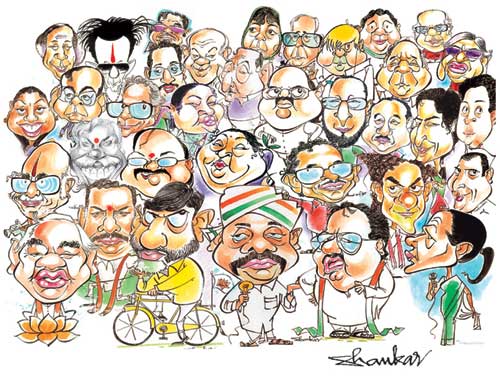While I have clients constantly asking questions related to their people issues, organization and corporate strategy, there are also the general questions on the state of the economy, markets and various management theories, I get to field. The most recent has been the tanking of the stock market – both the Dalal and the Wall Street and the eternal debate of “How much regulation is good?”Most of my replies are the logical dissection of the various parameters and the informed guesses and speculation on the future of business. I also attempt to create a model for clients to use and clarify such questions themselves. Now, the interesting or rather the difficult part of modeling is the inability of us professionals to create rules or patterns around various phenomenon. The corollary is the complaint that we tend to trivialize ‘facts’ by fitting them into models and formulae. As a senior client once commented “ You consultants have a model for everything – the only difference between you and an amateur mathematician is the jargon you paint it in and the tie !”
So I try to tread the waters to explain why markets are complex systems rather than rolling out another jabber or formula.
The financial system much like the ‘textbook’ complex entity is one that shows spatio-temporal correlations and are not determined purely by localized conditions. With large number of forces and flows affecting it, there are several limits to the tractability of the modeling process. Regulation brings in boundary conditions to any equation making it more focused for an optimization. Although at risk of classical reductionism, it also helps in detailed denotation in some of the presuppositions and logic. Regulation brings in a boundary condition that at times may 'intelligently' prevent 'excessive creativity.
Complexity brings with it its own virtues. Every complexity puts forth variables which we at times tend to neglect, newer permutations of key parameters and in essence brings out the need to always have a Plan B.In retrospect the immunity of our financial system vis-à-vis the western markets is perhaps a victory of institutional boundaries over individual unleashed creative thinking. There is an interesting article by David Brooks in the NY times speaking for institutional thinking over individual thinking - He says “Faith in all institutions, including charities, has declined precipitously over the past generation, not only in the U.S. but around the world. Lack of institutional awareness has bred cynicism and undermined habits of behavior. Bankers, for example, used to have a code that made them a bit stodgy and which held them up for ridicule in movies like ‘Mary Poppins.’ But the banker’s code has eroded, and the result was not liberation but self-destruction."
Like all management consultants, I have been pre-conditioned to avoid complexity when ever we enter the domain of decision making. May be there is a little virtue in using regulation to simplify the representation of financial market as a complex dynamical system.


.jpg)



No comments:
Post a Comment